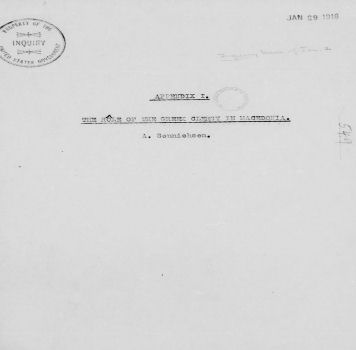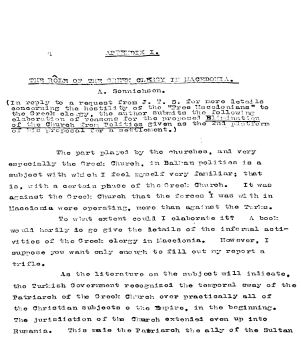 |
Appendix I. The rôle of the Greek clergy in Macedonia.
A. Sonnichsen.
Jan 29 1918 (Property of the Inquiry. United States Government)
Scans as a .pdf file (0.8 Mb) |
 |
(In reply to a request from J. T. S. for more details concerning the hostility of the “Free Macedonians" to the Greek clergy, the author submits the following elaboration of reasons for the proposed Elimination of the Church from Politics given as the 2nd platform of his proposal for a settlement.)
The part played by the churches, and very especially the Greek Church, in Balkan politics is a subject with which I feel myself very familiar; that is, with a certain phase of the Greek Church. It was against the Greek Church that the forces I was with in Macedonia were operating, more than against the Turks.
To what extent could I elaborate it? A book would hardly do go give the details of the infernal activities of the Greek clergy in Macedonia. However, I suppose you want only enough to fill out my report a trifle.
As the literature on the subject will indicate, the Turkish Government recognized the temporal sway of the patriarch of the Greek Church over practically all of the Christian subjects of the Empire, in the beginning. The jurisdiction of the Church extended even up into Rumania. This made the Patriarch the ally of the Sultan
![]()
2
in resisting the tendency of the Powers to trim down Turkey in Europe. When the Treaty of San Stefano was up for revision at the Berlin Conference, the representatives of the Patriarch clamored very loudly for the retention of Macedonia by Turkey, “because all the inhabitants were Greeks, and they would die before they would submit to Bulgarian rule”. Gladstone denounced the Greek Church very strongly at the time, saying it had played a "contemptible part", or words to that effect.
With liberation the people of Romania, Serbia and Bulgaria established churches of their own, and their nationals in Macedonia naturally preferred to belong to churches in which their own languages were spoken, etc. There were secessionist movements among the people on the one hand, and on the other hand the churches in the free states exerted themselves to obtain recognition in Constantinople. To this pressure the Turkish Government was often obliged to yield, even at the cost of his Greek ally, the Patriarch.
This, I think, makes the situation of the various churches obvious.
But the Greek Church stood alone in the violent methods it employed in combating the secessionist movements among the people and in attempting to bring back into the fold those who had already strayed. Terrorist bands wore openly organized in Greece and sent across the
![]()
3
frontier to terrorize the people. I have still a number of samples of the threatening letters which the leaders of those bands would send to the villagers before attacking them, written on paper bearing the ecclesiastical letter head stamp: crossed swords and a mitre. A lot more I sent to the Balkan Committee in London, to Noel Buxton. I personally have seen those bands burning villages and slaying the peasants, and those villagers were to my personal knowledge Bulgars. As an instance, one of their notable performances was the massacre of Zagoritchni, a large village near Castoria. An annonymous letter was sent to the villagers, signed "a friend", in which they were warned that the Turks were about to make an unusually thorough search for arms on a certain day. This caused the peasants to take their guns out of easily accessible hiding places and bury them. Then, on the day set, which was a Sunday, and while all the peasants were attending church, a band of several Greek "antari", as these "soldiers of Christ" were called, led by officers in the uniform of the Greek army, attacked the village and killed near a hundred old men, women and children, in some cases hacking the corpses of their victims actually into small pieces. Zagoritchni was razed flat to the ground, and when I visited the place some months later weeds were growing inside the roofless houses.
During my presence in Monastir the commander-in-chief of these terrorist bands in that section was a simple village cure, Father Stavre. He was a remarkably intelligent
![]()
4
fellow and was often sent to Western countries on diplomatic errands by the Church. His headquarters were in the garrisoned town of Pisoder , whence he directed operations. During my presence in the district we found a letter in cipher, evidently dropped on the mountain trail by a courier. We succeeded in finding the key to the cipher and translating the letter. It was obviously written by the Bishop of Castoria and was addressed to Father Stavre, notifying him that he was sending a certain Captain Bellos and his force, who would arrive a week or two latter and Father Stavre "might utilize him in carrying out the plans arranged between us for the burning of Boof”. Boof is a large Bulgar village in that neighborhood.
One of our Committee band leaders, who had been in Greece and could speak Greek almost without accent, undertook to impersonate Captain Bellos. He and half a dozen of our men dressed up in the fustani uniforms worn by the Greek antari, then sent down a letter to Father Stavre by a peasant picked up at random, advising him that "Captain Bellos had arrived and awaits your command up here on the mountain". The letter was written in the cipher, so it is not surprising that the priest was deceived. At any rate he responded and came up, attended only by a Turkish kavass. Of course, he never returned to the village. This is the sort of actual evidence I had of the activities of the Greek Church in Macedonia. Thus, I have read with my own eyes a letter written by a Greek Bishop, directing, or approving of the burning of a whole village of Bulgars. Officially Boof is a Greek village. On that sort of stuff Balkan statistics are built.
![]()
5
One of the most notorious of the Greek band leaders at the time I was there was Captain Akritas. We came into violent contact with him two or three times. During the Olympian Games celebrations in 1906, when European visitors flocked to Athens, among them two or three monarchs , this Captain Akritas played a very prominent part as having just returned from a visit to Macedonia (he was an officer of the royal bodyguard), and he spoke of the "oppression of the Bulgar brigands, etc". I believe one of his speeches was made in the presence of King Edward. At any rate, he was quite a figure in diplomatic circles, though I have viewed the corpses of women which he or his men slew.
The barbarities practiced right along by these Greek soldiers of the Church were even outside the Turkish pale; the Turks only did such things on tremendous occasions, when their fanaticism was at white heat. The Greeks did it as a practical measure to obtain a certain end, in cold blood. No other people in the Balkans have shown themselves so barbarous as the Greeks, neither Turks, Serbs, Vlachs, Bulgars, or even the Albanians, who have no pretentions to culture. As an instance, returning to father Stavre; during the insurrection of 1904 this priest wanted to accompany a certain Turkish force sent off on a punitive expedition, that he might point out certain objectionable Bulgars should he see them. The Turkish officer in command, an old major of the old school, refused to have him with him, saying “we can disgrace ourselves quite well without the assistance of the swine".